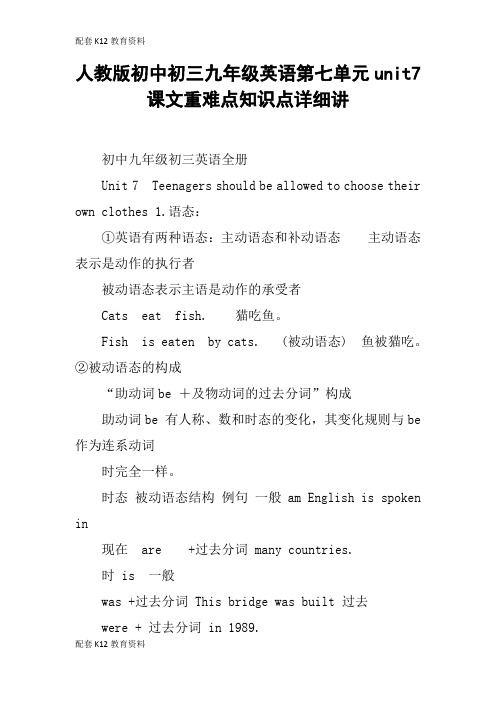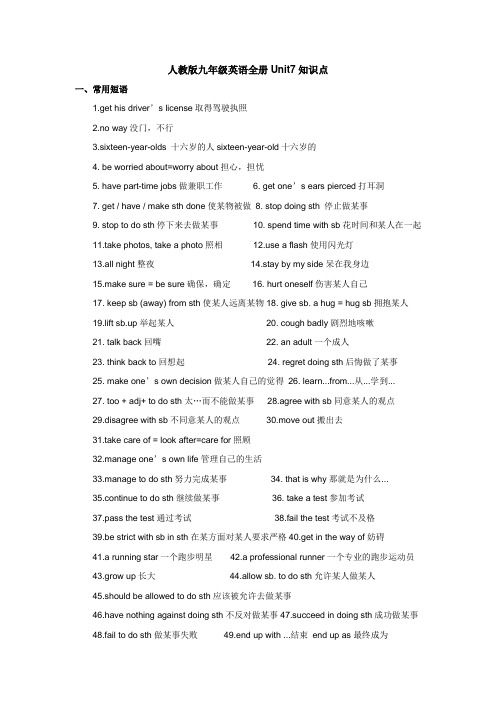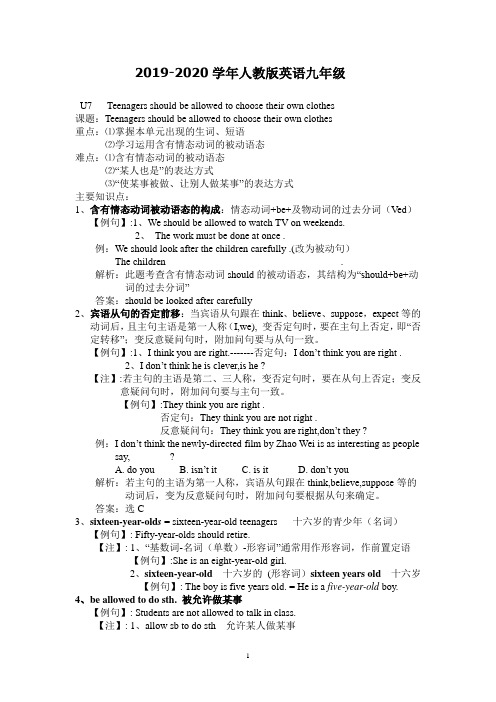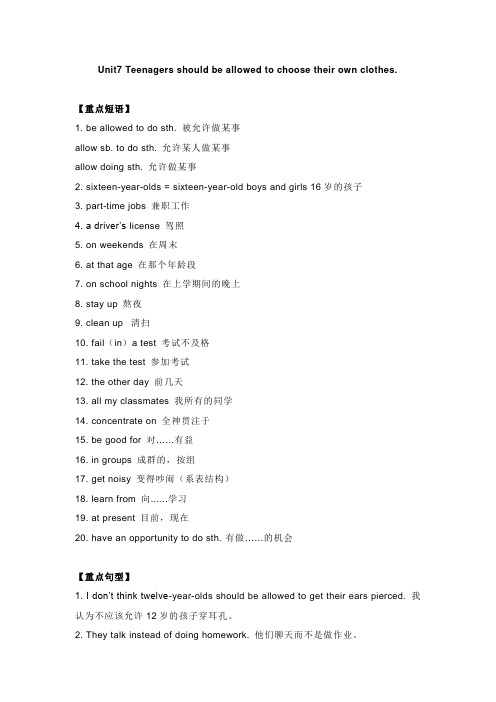人教版九年级英语unit7知识点讲解及同步练习
人教版九年级全册英语Unit7 SectionB 知识讲解+专题练习学案(含答案)

Unit7 SectionB知识讲解1. get in the way of挡……的路;妨碍by the way意为"顺便说一下";in a way意为"在某种程度上";on the/one’s way to...意为"在去……的路上";in this way意为"这样,以这种方式"。
2 We have nothing against running! 我们不反对跑步!(1)have nothing against (doing) sth. 意为"不反对(做)某事"。
(2)against介词,意为"反对;违背",其反义词为for,意为"支持"。
3 happen 不及物动词,意为"发生"。
(1)"Sth.+happened+地点/时间"意为"某地/某时发生了某事"。
(2)"Sth. + happened to sb."意为"某人出了某事(常指不好的事情)"。
(3)"Sb.+ happened to do sth."意为"某人碰巧做了某事"。
(4)"It happened + that从句"意为"碰巧……"。
4 choice 选择;抉择(1)choice常用于短语have no choice but to do sth.,意为"除了做某事以外,别无选择"或"只好做某事"。
(2)choice的动词形式为choose, choose to do sth.意为"选择做某事"。
5 Only then will I have a chance to achieve my dream.只有那样我才有机会实现自己的梦想。
本句是一个倒装句,正常语序是I will have a chance to achieve my dream only then.。
当only位于句首,其后接副词、介词短语或状语从句时,句子或主句要用部分倒装结构,即把助动词、情态动词放在主语前。
如果only后跟的是主语,则不用倒装。
专题练习一、单项选择1.—Hi, Billy! How was your trip to Xi'an?—It was _____. I caught a bad cold as soon as I got there.A.wonderful B.awfulC.comfortable D.peaceful2.The story reminds us that we could never make a ______ if we can’t keep it.A.wish B.choice C.decision D.promise 3.—Do your hobbies ________ your schoolwork, Linda?—Yes, sometimes. I think I should learn to plan my time carefully.A.play a part in B.have to do with C.get in the way of D.take the place of 4.Seeing their teacher _______ into the classroom, they stopped _______ at once. A.walk; telling B.entering; to speak C.enter; to tell D.walking; talking 5.He rides a bike to work every day in order to keep in ________.A.support B.service C.shape D.surface二、完型填空A new law in New York allows people to bring their dogs to restaurants. Some people 6 eating with dogs is great. They argue that it's good for dogs. They say owners don't have to leave their pets home alone or in cars while they eat out. But some peopleare7 about eating next to dogs. They say dog hair can create unclean conditions. Also, dogs can annoy (烦扰) customers8 barking (吠叫) or making a mess.Should dogs be9 in restaurants? Here is what two students think.YES! As long as dogs are well-behaved (很乖的) and clean, there's no10 why they shouldn't be allowed in restaurants with their owners. When restaurants allow dogs, people can spend more time with their11 . That will make them both happier. If someone doesn't want to eat near dogs, they can eat in the indoor part of therestaurant.12 they can go to a restaurant that doesn't allow dogs.Victoria Gonzalez,North CarolinaNO! Dogs 13 be allowed in restaurants. They can cause health problems. Some people are allergic (过敏的) to dogs, so being around dogs could be14 for them. Also, some dogs could annoy customers by jumping on them or stealing their food. Some dogs might even hurt customers. If that15 , restaurants may end up losing customers and money.Josh Cramer,Wisconsin 6.A.hope B.think C.hear D.see 7.A.happy B.sure C.worried D.honest 8.A.by B.in C.on D.with 9.A.allowed B.eaten C.drawn D.hidden 10.A.time B.place C.problem D.reason11.A.kids B.pets C.customers D.parents 12.A.But B.If C.Or D.So 13.A.would B.wouldn't C.should D.shouldn't 14.A.safe B.easy C.dangerous D.difficult 15.A.happens B.remains C.fails D.stops16.According to the material, experts encourage students to _____.A.review the texts B.discuss with each otherC.answer questions actively D.explain things in their own words 17.Who would like to ask a classmate rather than a teacher?A.Eliza.B.Judy.C.Tara.D.Sam.18.In Ted's school, students aren't allowed to talk in _____ classes.A.science B.art C.Chinese D.music 19.How many students think talking in class is a good idea?A.Two.B.Three.C.Four.D.Five. 20.Where could we read this material?A.In a storybook.B.On the website.C.On a notice board.D.In a student's diary.四、用所给单词的正确形式填空21.We have nothing against ___________ (run).22.Though the work was difficult, we _________ (success) in finishing it.23.Our teachers and parents often tell us the __________ (important) of English.24.He needs _____________ (spend) more time on his homework because __________ (become) a professional sports star is a difficult dream.25.What ______________ (happen) if he doesn’t end up as a professional runner?五、完成句子26.不管我们有多少困难,我相信所有的难题到最后都可以解决。
【配套K12】人教版初中初三九年级英语第七单元unit7课文重难点知识点详细讲

人教版初中初三九年级英语第七单元unit7课文重难点知识点详细讲初中九年级初三英语全册Unit 7 Teenagers should be allowed to choose their own clothes 1.语态:①英语有两种语态:主动语态和补动语态主动语态表示是动作的执行者被动语态表示主语是动作的承受者Cats eat fish. 猫吃鱼。
Fish is eaten by cats. (被动语态) 鱼被猫吃。
②被动语态的构成“助动词be +及物动词的过去分词”构成助动词be 有人称、数和时态的变化,其变化规则与be 作为连系动词时完全一样。
时态被动语态结构例句一般am English is spoken in现在 are +过去分词 many countries.时 is 一般was +过去分词 This bridge was built 过去were + 过去分词 in 1989.时can/should 情态 may +be+The work must be 动词过去分词 done right now. must/…③被动语态的用法当我们不知道谁是动作的执行者,或者没有必要指出谁是动作的执行者,或者只需强调动作的承受者时,要用被动语态。
2. allow sb. to do sth. 允许某人做某事如:Mother allows me to watch TV every night. 妈妈允许我每晚看电视。
be allowed to do sth. 被允许做某事如: Lily is allowed to go to Qinzhou. 莉莉被允许去钦州。
3. get their ears pierced 穿耳洞让/使做某事 get sth. done (过去分词) have sth. done (过去分词)如:I get my car mended. = I have my car mended. 我让别人修好我的车初中九年级初三英语全册初中九年级初三英语全册4. enough 足够形容词+enough 如:beautiful enough 足够漂亮enough+名词如:enough food 足够食物enough to 足够…去做…如:I have enough money to go to Beijing. 我有足够的钱去北京。
人教版九年级英语全册Unit7知识点

人教版九年级英语全册Unit7知识点一、常用短语1.get his driver’s license取得驾驶执照2.no way没门,不行3.sixteen-year-olds 十六岁的人sixteen-year-old十六岁的4. be worried about=worry about担心,担忧5. have part-time jobs做兼职工作6. get one’s ears pierced打耳洞7. get / have / make sth done使某物被做8. stop doing sth 停止做某事9. stop to do sth停下来去做某事10. spend time with sb花时间和某人在一起11.take photos, take a photo照相e a flash使用闪光灯13.all night整夜14.stay by my side呆在我身边15.make sure = be sure确保,确定16. hurt oneself伤害某人自己17. keep sb (away) from sth使某人远离某物18. give sb. a hug = hug sb拥抱某人19.lift sb.up举起某人20. cough badly剧烈地咳嗽21. talk back回嘴22. an adult一个成人23. think back to回想起24. regret doing sth后悔做了某事25. make one’s own decision做某人自己的觉得26. learn...from...从...学到...27. too + adj+ to do sth太…而不能做某事28.agree with sb同意某人的观点29.disagree with sb不同意某人的观点30.move out搬出去31.take care of = look after=care for照顾32.manage one’s own life管理自己的生活33.manage to do sth努力完成某事34. that is why那就是为什么...35.continue to do sth继续做某事36. take a test参加考试37.pass the test通过考试38.fail the test考试不及格39.be strict with sb in sth在某方面对某人要求严格40.get in the way of妨碍41.a running star一个跑步明星42.a professional runner一个专业的跑步运动员43.grow up长大44.allow sb. to do sth允许某人做某人45.should be allowed to do sth应该被允许去做某事46.have nothing against doing sth不反对做某事47.succeed in doing sth成功做某事48.fail to do sth做某事失败49.end up with ...结束end up as最终成为50.practice doing sth练习做某事51.see sb. do sth看见某人做了某事52.spend time on sth在某事上花时间spend time in doing sth在做某事上花时间53. care about sb关心某人54.talk with sb. about sth.和某人谈论某事55.make a choice做选择56.have a chance to do sth有机会去做某事二、短语用法集锦1.She is a sixteen-year-old girl.=She is sixteen years old.2. allow sb. to do sth. 允许某人做某事(主动语态)be allowed to do sth. 被允许做某事(被动语态)Mother allows me to watch TV every night.LiLy is allowed to go to America.3. get their ears pierced 穿耳洞让/使(别人)做某事get sth. done(过去分词) have sth. doneI get my hair cut. == I have my hair cut.4. enough 足够形容词+enough 如:beautiful enough足够漂亮enough+名词如:enough food 足够食物enough…to 足够…去做…例:I have enough money to go to Beijing. 我有足够的钱去北京。
人教版英语九年级unit7单元知识点

2019-2020学年人教版英语九年级U7 Teenagers should be allowed to choose their own clothes课题:Teenagers should be allowed to choose their own clothes重点:⑴掌握本单元出现的生词、短语⑵学习运用含有情态动词的被动语态难点:⑴含有情态动词的被动语态⑵“某人也是”的表达方式⑶“使某事被做、让别人做某事”的表达方式主要知识点:1、含有情态动词被动语态的构成:情态动词+be+及物动词的过去分词(Ved)【例句】:1、We should be allowed to watch TV on weekends.2、The work must be done at once .例:We should look after the children carefully .(改为被动句)The children ______ ______ ______ _______ _______ .解析:此题考查含有情态动词should的被动语态,其结构为“should+be+动词的过去分词”答案:should be looked after carefully2、宾语从句的否定前移:当宾语从句跟在think、believe、suppose,expect等的动词后,且主句主语是第一人称(I,we), 变否定句时,要在主句上否定,即“否定转移”;变反意疑问句时,附加问句要与从句一致。
【例句】:1、I think you are right.-------否定句:I don’t think you are right .2、I don’t think he is clever,is he ?【注】:若主句的主语是第二、三人称,变否定句时,要在从句上否定;变反意疑问句时,附加问句要与主句一致。
【例句】:They think you are right .否定句:They think you are not right .反意疑问句:They think you are right,don’t they ?例:I don’t think the newly-directed film by Zhao Wei is as interesting as people say, _______ ?A. do youB. isn’t itC. is itD. don’t you解析:若主句的主语为第一人称,宾语从句跟在think,believe,suppose等的动词后,变为反意疑问句时,附加问句要根据从句来确定。
人教版英语九年级Unit7单元知识点归纳

Unit7 Teenagers should be allowed to choose their own clothes.【重点短语】1. be allowed to do sth. 被允许做某事allow sb. to do sth. 允许某人做某事allow doing sth. 允许做某事2. sixteen-year-olds = sixteen-year-old boys and girls 16岁的孩子3. part-time jobs 兼职工作4. a driver’s license 驾照5. on weekends 在周末6. at that age 在那个年龄段7. on school nights 在上学期间的晚上8. stay up 熬夜9. clean up 清扫10. fail(in)a test 考试不及格11. take the test 参加考试12. the other day 前几天13. all my classmates 我所有的同学14. concentrate on 全神贯注于15. be good for 对…...有益16. in groups 成群的,按组17. get noisy 变得吵闹(系表结构)18. learn from 向......学习19. at present 目前,现在20. have an opportunity to do sth. 有做……的机会【重点句型】1. I don’t think twelve-year-olds should be allowed to get their ears pierced. 我认为不应该允许12岁的孩子穿耳孔。
2. They talk instead of doing homework. 他们聊天而不是做作业。
3. He is allowed to stay up until 11:00 pm. 允许他们熬到晚上11点。
人教版英语九年级全册单元unit 7 知识点+测试卷+思维导图

Unit 7 Teenagers should be allowed to choose their own clothes.1.重点词汇:license, safety, field, hug, poem, community, chance, society, choice, smoke, cry, life, regret, manage, educate, enter, support...2. 短语归纳:1.get his driver’s license 取得他的驾驶执照2.no way没门,不行3.sixteen-year-olds 十六岁的人4. be worried about=worry about 担5. have part-time jobs 做兼职工作6. get one’s ears pierced 打耳洞7. get / have / make sth. done 使某物被做……8. stop doing sth 停止做某事9. stop to do sth. 停下来去做某事10. spend time with sb. 花时间和某人在一起11.take photos, take a photo 照相e a flash 使用闪光灯13.all night 整夜14.stay by my side 待在我身边15.make sure = be sure 确保,确定16.keep sb. (away) from sth使某人远离某物17. hurt oneself 伤害某人自己18. give sb. a hug = hug sb. 拥抱某人19.lift sb. up 举起某人20. cough badly 剧烈地咳嗽3. 必背典句:1.-I don’t think sixteen-year-olds should be allowed to drive. 我认为十六岁的孩子不应该被允许开车。
2022人教版九年级英语unit7--8单元重难点复习+同步测试无答案
Unit 7 Teenagers should be allowed to choose their own clothes.Section A重点单词✍朗读下列单词。
1. *license /'laɪsns/ n. 证;证件2. safety /'seɪftɪ/ n. 安全;安全性3. smoke /sməʊk/ v. 冒烟;吸烟n. 烟4. part-time /ˌpɑ:( r)t'taɪm/ adj.& adv. 兼职(的)5. *pierce /pɪəs/,/pɪrs/ v. 扎;刺破;穿透6. *earring /'ɪərɪŋ/,/'ɪrɪŋ/ n.耳环;耳饰7. flash /fl/ n. 闪光灯;闪光v. 闪耀;闪光8. tiny /’ta ni/ adj. 极小的;微小的9. cry /kraɪ/ v. & n. 哭;叫喊10. field /fi:ld/ n. 田野;场地11. *hug /hʌg/ n.& v. 拥抱;搂抱12. *lift /lɪft/ v. 举起;抬高n. 电梯;搭便车13. *badly /'bædlɪ/ adv. 严重地;差;非常14. *awful /'ɔ:fl/ adj. 很坏的;讨厌的15. *teen /ti:n/ n. (13至19岁之间)青少年16. regret /rɪ’gret/ v. & n. 感到遗憾;懊悔17. *poem /'pəʊɪm/ n. 诗;韵文18. *community /kə'mju:nətɪ/ n. 社区;社团19. chance /tʃɑ:ns/,/tʃæns/ n. 机会;可能性18. educate /'edʒʊkeɪt/ v. 教育;教导19. manage /'mænɪdʒ/ v. 过多成(困难的事);应付(困难局面)20. society /sə'saɪətɪ/ n. 社会✍朗读下列变形的单词1. safe—safety (n.)—safely (adv.)—dangerous (反义词)2. bad—badly (adv.)—worse (比较级)—worst (最高级)3. choose—chose (过去式)—chosen (过去分词)4. angry—angrily (adv.)—anger (n.)5. educate—education (n.)—educational (adj.)6. smoke—smoky (adj.)—smoker (n.人)7. poem—poet (n.人)8. social—society (n.)9. manager—manage (v.)10. regret—regretted (过去式过去分词)11. hug—hugged (过去式过去分词)12. laugh—cry (反义词)重点短语✍朗读下列短语1. talk back回嘴;顶嘴2. keep…away from避免接近;远离3. make one's own decision自己做决定4. allow sb. to do sth.允许某人做某事5. be excited about doing sth. 做某事感到兴奋6. all night整夜7. make sure确定;确认=be sure8. lift up举起9. cough badly咳嗽得厉害=cough a lot10. give sth. to sb.给某人某物11. awful dreams噩梦12. go out with friends和朋友们外出13. think back to sth.回想起某事14. be late for school上学迟到=arrive at school late15. stay out待在外面16. regret doing sth.后悔做了某事(已做)17. regret to do sth.遗憾做某事(未做)18. give sb. chances to do sth. 给某人机会做某事19. move out搬出去20. manage one's own life 驾驭某人自己的生活21. get their ears pierced 穿耳洞=have their ears pierced重点句子✍朗读下列句子。
人教版九年级全一册英语Unit7单元语法知识点总结
人教版九年级全一册英语Unit7单元语法知识点总结本单元重点短语的具体用法1. get his driver’s license:取得驾驶执照。
例如:He finally got his driver's license after many attempts.(经过多次尝试,他终于拿到了驾驶执照。
)2. no way:没门,不行。
例如:- Can I have a day off?(我能请一天假吗?)- No way!(不行!)3. sixteen-year-olds:十六岁的人,是一个复数名词,表示十六岁的群体。
例如:Sixteen-year-olds are not allowed to vote in this country.(在这个国家,十六岁的人不被允许投票。
)而sixteen-year-old 则是一个形容词,用来修饰名词,表示“十六岁的”。
例如:He is a sixteen-year-old boy.(他是一个十六岁的男孩。
)4. be worried about = worry about:担心,担忧。
例如:Don't worry about the exam. You will do fine.(不要担心考试,你会做得很好的。
)或者She is worried about her son's health.(她担心她儿子的健康。
)5. have part-time jobs:做兼职工作。
例如:Many college students have part-time jobs to earn some extra money.(许多大学生做兼职工作来赚一些额外的钱。
)6. get one’s ears pierced:打耳洞。
例如:She wants to get her ears pierced, but her parents don't allow it.(她想打耳洞,但她的父母不允许。
人教版九年级英语全册 Unit 7 同步练习(含答案)
7. 用闪光灯拍照8. 给某人唱歌9. 穿过田野10. 确保11. 远离危险12. 和某人顶嘴13. 让我做噩梦14. 为社区做社会工作15. 参加考试16. 考试不合格17. 考试合格18. 物理考试不合格19. 上课迟到20. 对某人有耐心21. 对某人严格要求22. 对某事严格要求23. 阻碍;妨碍24. 尽可能…25. 在校游泳队26.一个专业跑步运动员27. 实现梦想28. 不反对跑步5.应该允许你选择自己的衣服吗?6.我父母不反对我自己做决定。
7.我需要考虑清楚如果我在期末考试中不合格将会发生什么?8.只有到那时我才有机会实现我的梦想。
选择填空:( )1.In our school library there_______ a number of books on science, and in these years the number of them_______ growing larger and larger.A.support B.is supported C.be supported D.be supporting( )4.一Why do you study so hard?一Because I have no ________ but to go to college.A.chance B.regret C.choiceD.poem( )5.My bike is broken. I want to get it ________.A.mend B.to mend C.mendingD.mended( )6.They are only told to work hard, but few really _______ their personal interests.A. hear aboutB. care aboutC. learn aboutD. complain about( )7.Jack can’t go out to play until his homework ____.A. is finishedB. finishesC. has finishedD. finished( )8.Nothing can get ________ of the relationship between a mother and her children.A.on the way B.by the way C.in the way D.at the way( )9.My uncle didn’t regret _______ so much time on the novel.A.spend B.to spend C.spentD.spending( )10.Children ____ care of themselves from a very young age.A. should be educated to takeB. should educate to takeC. should be educated takingD. should educate to taking( )11.The teacher told us that our class rules must ________.A.follow B.be follow C.be followedD.follows( )12.______ should be asked to help with housework at home.A.Ten-year-old B.Ten-year-olds C.Ten year oldD.Ten years old( )13.—Can I help you carry that box?—Thanks,but I can ______ it myself.A.pass B.relax C.changeD.manage( )14.Most of the club members agreed to the plan; only a few were _____ it.A.for B.of C.againstD.without( )15.Eric is a good boy and he never _______ his parents.A.takes care of B.pays attention to C.takes hold ofD.talks back to( )16.We won’t allow ______ in the cinema. But you are allowed _________ in the resting place.A.smoke; smoking B.to smoke; to smokeC.smoking; to smoke D.to smoke; smoking( )17.There is something wrong with my computer;I have to have it__________.A.to repair B.repaired C.fix up D.to fix up( )18.─The school will send me to study language teaching in America.─What a good__________!You can't miss it.A.condition B.chance C.changeD.cover信息归纳(本题共5小题,每小题1分,共5分)It is believed that social networks allow people to make their online social circle larger. But having 150 friends on WeChat is not the same thing as having 150 friends in real life.In last week's Chitchat, we asked our readers how many "friends" did they have in their WeChat account(账户), and how many of them were "actual friends". Here are some of the top comments(评论).@left and rightI have more than 1,000 friends in WeChat. However, the numberof "friends" I communicate with daily is less than 50, most of whomare my classmates and families. So many friends are just there and wenever speak any word.@Kris Wilson ChoyI have almost 300 friends in my WeChat. However, people who I often send messages to is just10. Most of these friends are classmates or people who work with me. Except work or studying, we hardly talk with each other during our spare time.@MonicaTo be honest, as an English teacher since 1981, I have more than 400 WeChat friends, most of whom are my students, students' parents, and workmates. Although we seldom meet face to face,other age group. Being a teenager is hard.You are not a child any more, but you are not a (an) 2 ,even though you have to deal with some grown-up problems and make decisions by 3 . Families can be one of the biggest causes of stress, such as problems of arguing with 4 or brothers or sisters. Teenagers also have lots of stress from 5 ,either from their teachers or from their classmates. Some teenagers also feel 6 about choosing their education after high school. Getting a place at university can be very difficult and some can't afford to go to university. It is hard for some teenagers to 7 a job after they graduate. There are so many young people finishing school but not enough jobs for them. 8 there is a lot of stress, you can find many ways to 9 with it. Talking to people is one of the best ways to deal with stress. It may sound simple,but it is 10 .阅读理解:For Miller, an 80-year-old man, it’s a chance of a lifetime. Miller is a part of a group ofAs Shi Xiang, head of China Tours says “Being a new brand to attract foreign visitors, the Silk Road is good for people to know more about China, especially the northwestern part of the country.”( ) 1. How will the group of around 60 Germans have the tour?A. By plane.B. By bus.C. On foot.D. By train.( ) 2. Where will the German group enter China?A. From Beijing.B. From the western part of China.C. From the eastern part of China.D. From Shanghai.( ) 3. The underlined word “destinations” in the fifth paragraph means .A. 标志B. 道路C. 品牌D. 目的地( ) 4. According to the passage, how long has China Tours managed the trip?A. For 20 years.B. For 5 years.C. For 10 years.D. For 26 months.参考答案:短语复习:1 should be allowed to do sth2 have a part-time job3 get the driver’s license4 need to sleep5 spend time with sb6 be / get excited about…7 use the flash to take photos 8 sing to sb9 run through the field 10 make sure11 keep away from danger 12 talk back to sb13 give me awful dreams 14 do society work for the community15 take / have the test ( exam) 16 fail the test17 pass the test 18 fail in physics19 get to class late / be late for class 20 be patient with sb21 be strict with sb 22 be strict in sth23 get in the way of… 24 as…as possible25 on the school swimming team 26 a professional runner27 achieve one’s dream 28 have nothing against running29 end up as… 30 enter university31 be serious about 32 care about翻译句子:1.Are you worried about failing in chemistry?Do you worry about failing in chemistry?2.Should 16-year-olds be allowed to have part-time jobs?3.Should an 11-year-old girl be allowed to get ears pierced?4.Do you think we must keep teenagers away from the Internet?5.Should you be allowed to choose your own clothes?6.My parents have nothing against making my own decisions.My parents have nothing against making decision for myself.7.I need to think about what will happen if I fail in the final exam?8.Only then will I have a chance to achieve my dream.选择填空:1---5 ACCCD 6---10 BACDA 11---15 CBDCD 16---20 CBBCD信息归纳:1.Social networks2.His classmates and families3.Work and studying4.38 years5.Because it serves to glue their ties短文填空:1 more2 adult3 yourself4 parents5 society6 stressed7 find / get8 Though9 deal / do 10 useful /helpful阅读理解:1---5 BBDCB。
人教版初中英语九年级全一册 Unit7 知识清单+习题
人教版初中英语九年级全一册Unit7 知识清单+习题九年Unit 7 Teenagers should be allowed to choose their own clothes.一、必会单词license n (=licence)证件safety n.安全;安全性smoke v吸烟;冒烟,n.烟part-time adj&adv兼职(的) pierce v扎;刺破;穿透earring n耳环;耳饰flash n闪光灯;闪光v.闪耀;闪光tiny adj极小的;微小的cry v&n哭;叫喊field n.田野;场地hug n&v拥抱;搂抱lift v举起;抬高n电梯;搭便车badly adv严重地;差,非常awful adj很坏的;讨厌的teen n.(13至19岁之间的)青少年regret v&n.感到遗憾;懊悔poem n.诗;韵文community n社区;社团chance n.机会:可能性educate v教育;教导manage v完成(困难的事);应付(困难局面) society n.社会support v&n.支持enter v进来;进去choice n选择;挑选二、常考短语、用法go to the shopping center去购物中心have part-time jobs 做兼职工作be excited about对…感到兴奋by my side在我身边make sure确信talk back回嘴;顶嘴agree with sb.同意某人(的意见、观点等) keep … away from避免接近;远离manage one’s own life应付自己的生活be strict with sb.对某人要求严格achieve one’s dream实现某人的梦想enter university进入大学be serious about认真对待make this choice做出这个选择keep off关闭be worried about为……担心get one’s ears pierced扎耳洞take lots of photos拍许多照片through the field穿过田间give sb. a hug给某人一个拥抱listen to sb.听某人的话learn...from向…学习…make one's own decision自己做决定in most Asian societies在大多数亚洲社会get in the way of挡……的路;妨碍how much多么end up结東care about关心in the end最后be allowed to do sth被允许做某事get sth.done使某事被做what to do做什么spend time with sb与某人共度时光be excited about doing sth.对做某事感到兴奋hurt oneself伤到自己regret doing sth.懊悔做某事take care of oneself照顾自己continue to do sth.继续做某事love doing sth.喜欢做某事have nothing against doing sth.不反对做某事have a chance to do sth.有机会做某事spend more time on sth.在某事上花费更多时间stop doing sth停止做某事should do sth.应该做某事need to do sth.需要做某事give sth. to sb把某物给某人allow sb. to do sth.允许某人做某事start doing sth,开始做某事see sb do sth.看见某人做过某事三、基本句型1.I don't think sixteen-year-olds should be allowed to drive2. They aren't serious enough3. Teenagers should not be allowed to smoke.4. Sixteen-year-olds should be allowed to get their ears pierced5. Only then will I have a chance to achieve my dream6. ---Do you think teenagers should be encouraged to make their own decisions?---No, I don't agree with this. Teenagers are too young to make their own decisions.7.Do you think we must keep teenagers away from the Internet?四、重点语法含有情态动词的被动语态1). Teenagers should be allowed to choose their own clothes.应该允许青少年选择他们自己的衣服。
- 1、下载文档前请自行甄别文档内容的完整性,平台不提供额外的编辑、内容补充、找答案等附加服务。
- 2、"仅部分预览"的文档,不可在线预览部分如存在完整性等问题,可反馈申请退款(可完整预览的文档不适用该条件!)。
- 3、如文档侵犯您的权益,请联系客服反馈,我们会尽快为您处理(人工客服工作时间:9:00-18:30)。
Unit7 Teenagers should be allowed to choose their ownclothes第一课时sectionA(1a-2d)课堂考点探究1.license n.(=licence)证;证件driver's license 驾照2.safety n.安全;安全性其形容词形式为safe,意为“安全的”。
其反义词为danger,意为“危险”3.smoke 的用法▲作不可数名词,意为“烟”如:The chimneys of factories pour plenty of smoke into the air.工厂的烟自把大量的烟雾排放到空气中。
▲作动词,意为“冒烟:吸烟”如:Peter smokes several cigars every day,彼得每天抽好几支雪茄.4.get ears pierced 打耳洞此结构:“get+宾语十宾语补足语(过去分词)"表示“使某事被做:请别人做某事”,其中get 可用have替换。
过去分词表示的动作往往是别人做的,与句子的主语无关。
如:My bike is broken. I will get/have it fixed up tomorrow morning.我的自行车坏了我明天早上找人修理它。
5I don't think sixteen-year-olds should be allowed to drive.我认为十六岁的孩子不应该被允许开车。
▲本句采用了否定前移,真正的否定在后面从句中。
▲sixteen- year-olds 是合成词,表示“十六岁的孩子”,相当于sixteen-year- old children。
合成名词的复数形式通常只将其中的主体名词变成复数。
如:grown-ups成人▲allow“允许;准许”,通常用于以下结构中:allow doing sth.允许做某事allow sb.to do sth.允许某人做某事should be allowed to do sth.应该被允许做某事【注意】含有情态动词的被动语态结构:情态动词+be+动词的过去分词积累词汇·打好基础I.选择方框里的词并用其适当形式填空。
fix, license, earring, safe, pierce,1. _________isn't allowed in the hospital.2. You mustn't drive on the road without a driver's_______.3. Sixteen-year-olds shouldn't be allowed to get their ears_________.4. My aunt bought a pair of silver __________last week.5.For_________ ,you should always climb the mountain with a partner.6. My bike is broken.I will have it __________up tomorrow morning.Ⅱ.根据下面的对话情景,在每个空白处填上一个适当的句子,使对话的意思连贯、完整。
A: You look unhappy,Jack.1. _______________________________?B:I wanted to visit my grandparents,2.__________________________________.A:Why?B:Because I wanted to go to my grandparents' house by bike, but they thought it was too dangerous. So I argued with them.A:3. ___________________________________________?B:They live in the countryside.A:I agree with your parents.4. ___________________________________. It's a littlefar and there are too many cars on the way.B:Maybe you are right. What should I do then?A:5.______________________________________________.B:OK.Thanks.B 综合训练·提升能力Ⅲ.完形填空。
Sun Li was not happy at school last month. It was not because 1 hated school. It was because of her 2 .Sun studies in Anhui. Her school has a 3 rule about hair: no changing your hair color,no 4 hair; boys should have a crew cut(平头) , 5 girls' hair can't hang past their ears.Sun and the other girls in her class hate the 6 . They call it ‘mushroom head(蘑菇头)”.Sun's story is not the 7 one. In many other schools, there is also a hairstyle 8 . Last week in a school in Beijing,some students were 9 to cut their long hair.Mr. Xu is the headmaster of the school.In his school, girls can't have hair 10 their shoulders(肩膀). He says the hair rule is there for a good 11 .“Everybody needs to have a look that matches his or her job," says Mr. Xu.“Those hairstyles are12 adults. Students are 13 from adults.”The strict hair rule is not only made for students. Teachers also have to 14 it. “While students can't change their hair color, 15 can their teachers,”says Mr.Xu.( )1.A.I B.she C.he D.they( )2. A.study B.talent C.hair D.clothes( )3.A.strict B.personal C.lucky D.natural( )4.A.beautiful B.short C.clean D.curly( )5.A.or B. so C.and D.if( )6.A.rule B.hairstyle C.exam D.review ( )7.A.same B.old C.only D.clear ( )8.A.rule B.story C.safety D.idea( )9.A.allowed B. helped C.stopped D.asked ( )10.A.before B.after C.past D.under ( )11.A.history B.future C.promise D.reason ( )12.A.with B.for C.of D.about ( )13.A.different B.safe C.fair D.peaceful ( )14.A.introduce B.follow plete D.copy ( )15. A.neither B.either C.also D. so Ⅳ.根据材料内容,从下面五个选项中选出能填入文中空缺处的最佳选项,使短文意思通顺、内容完整。
Traveling by subway can be quite hard,especially during rush hour. You have to fight your way into the carriage(车厢).1. ________The smells of some passengers' food are very strong,too.Since April, the government of Beijing has been collecting opinions on the revised(修订的)Beijing Metro Passenger Rules.2._____Four kinds of actions were added to the revised rules. 3. __________Besides, eating or drinking,riding without paying the ticket and handing out advertisements are included.4. ________The rules say that all passengers except(除了) people with certain needs are not allowed to eat or drink on the subway. Others think drinking water should be allowed.5._________“What problems will it cause if I just quietly eat some food that doesn't have any smell and hold on to the packaging(包装) when I'm done?”a traveler said.A.However,people have different opinions about eating and drinking on the subway.B. They include stealing others' seats.C. People can get thirsty on the crowded subway.D. And you have to avoid coffee that could spill(洒) on you.E. The rules say that if passengers don't follow the rules on the subway, they will end up with bad credit(信用) scores.V.(郑州期末)阅读短文,根据语篇要求填空,使短文通顺、意思完整。
